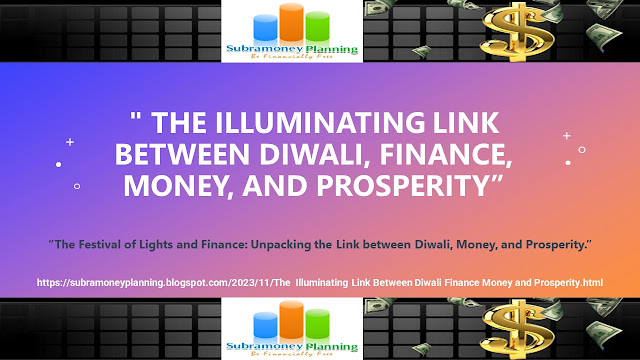Diwali, the festival of lights, is not just a time for celebration, but it also holds a special significance in the world of finance and money matters. As one of the most significant festivals in India, Diwali is associated with various customs and rituals that reflect its close connection to prosperity, wealth, and financial well-being. In this blog post, we will explore the link between Diwali, finance, and money, examining the customs, traditions, and practices that underpin this connection. We will also provide examples that illustrate the financial lessons embedded in Diwali traditions and how they can be applied to modern financial planning and management.
The Illuminating Link Between Diwali, Finance, Money, and Prosperity Subramoneyplanning1. The Lakshmi Puja - Worshiping the Goddess of Wealth:
• Diwali is incomplete without the traditional Lakshmi Puja, where people invoke the blessings of Goddess Lakshmi for wealth and prosperity.
• Example: The act of worshipping Goddess Lakshmi on Diwali signifies the importance of seeking financial well-being and abundance. It is a reminder to manage and invest money wisely to attract wealth.
2. Cleaning and Organizing - Decluttering for Financial Health:
• Before Diwali, people engage in cleaning and organizing their homes. This practice symbolizes the removal of clutter and negative energies.
• Example: Just as we clean our homes, it's essential to declutter our finances by eliminating unnecessary expenses and organizing financial records. This practice can lead to a healthier financial state.
3. Buying Gold and Assets - Investments for the Future:
• Gold is a popular purchase during Diwali, symbolizing wealth and financial security.
• Example: Investing in gold or assets can be seen as a form of financial planning for the future. Buying assets that appreciate over time is a prudent financial move.
4. Gift-Giving - Sharing Prosperity:
• Exchanging gifts is a common Diwali tradition, signifying the joy of sharing one's prosperity with loved ones.
• Example: This practice highlights the importance of charitable giving and helping those in need. It reminds us that financial prosperity should be shared and used for the betterment of society.
5. Budgeting for Diwali Expenses:
• Preparing a budget for Diwali expenses, including gifts, decorations, and sweets, is crucial to avoid overspending.
• Example: Budgeting for Diwali mirrors the importance of creating and adhering to a financial plan in everyday life. It helps prevent financial stress and debt.
6. Debt Clearance - Starting Anew:
• Diwali signifies a fresh start, and many people pay off debts to begin the year on a clean slate.
• Example: Clearing debts is an important financial goal. It's an opportunity to reduce interest payments and improve one's financial well-being.
7. Financial Goal Setting - The Path to Prosperity:
• Many people set financial goals for the upcoming year during Diwali, such as savings targets or investment plans.
• Example: The act of setting financial goals is a fundamental principle of financial planning. It provides direction and purpose to your financial decisions.
8. Investment in Education - The Value of Knowledge:
• Some communities initiate their children into learning on Diwali, emphasizing the importance of knowledge and education.
• Example: Education is an invaluable asset. It equips individuals with the skills and knowledge to make informed financial decisions and achieve financial success.
9. Business Expansion - Seizing Opportunities:
• Diwali is considered an auspicious time for starting new ventures or expanding existing businesses.
• Example: Recognizing opportunities and taking calculated risks is a part of financial growth. Diwali teaches us to embrace new beginnings.
10. Planning for Retirement - Ensuring Financial Security:
• Diwali traditions, such as gifting and investing in assets, can also be seen as a way to plan for one's retirement and financial security.
• Example: Retirement planning is a critical aspect of financial management. Diwali reminds us to consider our financial well-being in the long term.







0 comments:
Post a Comment